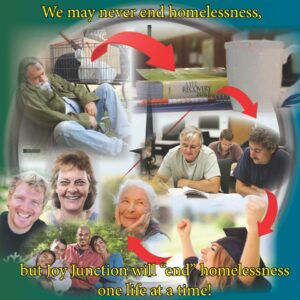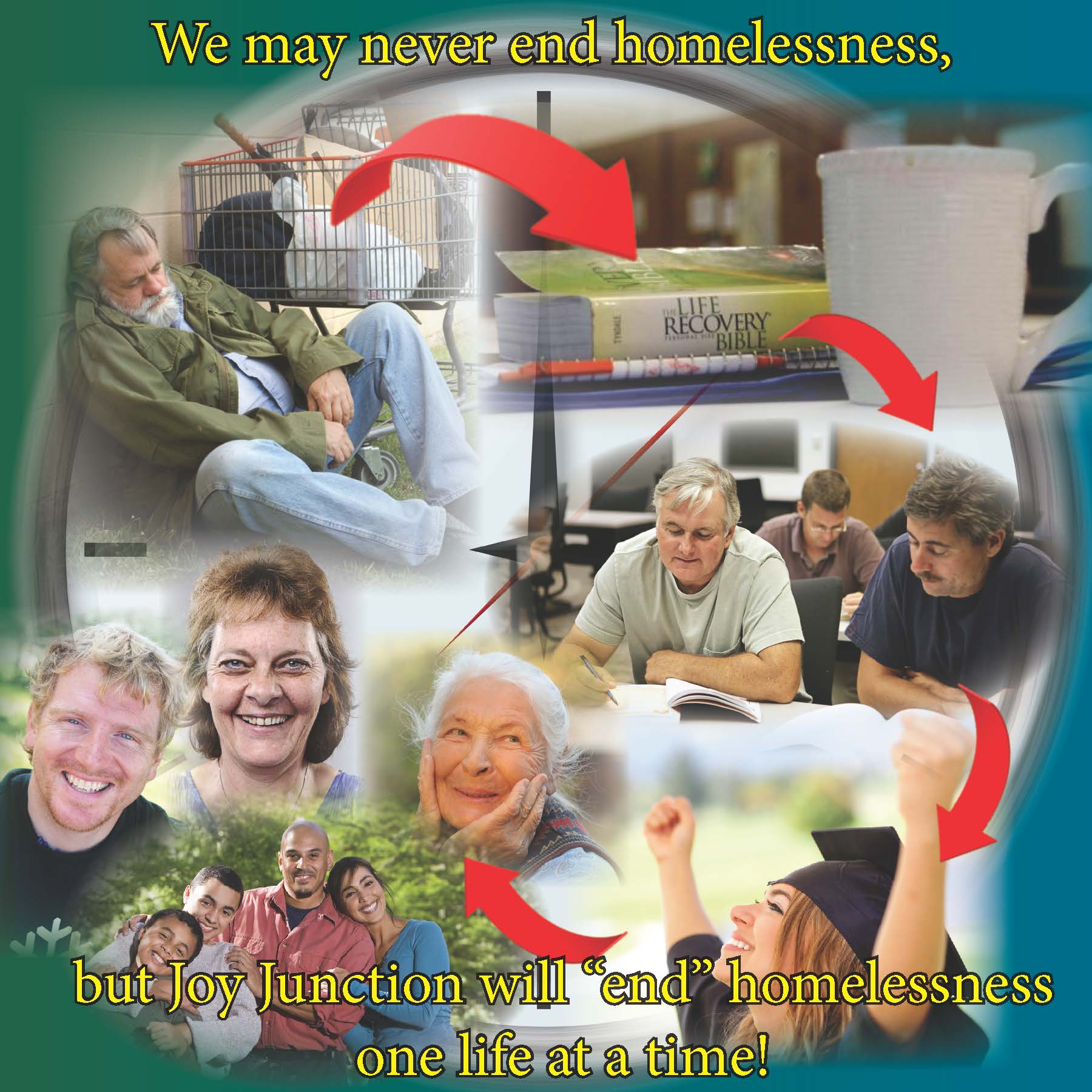By Jeremy Reynalds, Ph.D.
Founder and CEO
Joy Junction Inc.
 You seem to hear it all the time: cities claiming to have ended either chronic or veteran homeless. Other communities have a three, five or ten year “plan” to end homelessness.
You seem to hear it all the time: cities claiming to have ended either chronic or veteran homeless. Other communities have a three, five or ten year “plan” to end homelessness.
Perhaps it’s because the federal government has similar unbridled rhetoric.
A recent paper by U.S. Dept. Of Health and Human Services Secretary Sylvia Mathews Burwell reads in part, “What if, in just a few years, we could help the more than a million people including children, families and veterans who have no place to call home? What if we finally and completely ended homelessness in the United States? … Together, we’re charting a path toward ending veteran homelessness by 2015, chronic homelessness by 2017, and family, youth, and child homelessness by 2020 … Homelessness is a complex issue, but it’s one we know how to solve.”
This thinking is also in vogue at the local level as well. Part of the executive summary of a report by the New Mexico Coalition to End Homelessness reads in part, “For over two decades, communities all over the United States have struggled with homelessness. Yet, we are confident that we now know what it takes to end homelessness and that now is the time to take advantage of promising new research and emerging models that show us how we can do so.”
But are such hopeful statements grounded in any form of reality? Remember that the number of homeless people is not static. It is very fluid, changing from day to day-even hourly. As homeless people get placed into housing, others individuals are thrust into homelessness.
I asked Joy Junction Resident Services Manager Denis Billy to ask a few of our guests what they thought about the concept of ending homelessness. For the most part, their approach was more realistic.
One of them said that homelessness will never be ended as long as there are drugs or alcohol in the world.
Another guest agreed, saying she thought that homelessness will always be around.
She said her approach to help the situation would be similar to Joy Junction’s, but perhaps a little more expansive as she would reach out more to addicts and the mentally challenged.
She continued, “A lot of us get judged and refused help due to those kind of issues. If we were just given a chance, we would probably feel some hope and not feel so discouraged. This would help us get ourselves together.”
Another guest said she doesn’t think there is enough money in the state to help every individual and family teetering on the precipice of homelessness. She said that to do anything realistic toward achieving that goal, New Mexico would probably need more help from the federal government.
She added, “If I could help end homelessness, I would start asking the homeless people what got them there, and then I would start a campaign to end hunger and homelessness in the community. Other people in our city and state can help to contribute their money and time for the homeless.”
Another guest told us that there will always be “obstacles” that lead to homelessness. This man said he was in jail for many months.
He added, “Upon my release, I had nothing left to my name. No home, no car, no personal belongings. Life throws many obstacles for us to overcome loss of jobs, freedom and self control.”
Another individual said she doesn’t believe that ending homelessness is a “feasible expectation.”
“Throughout the years, I’ve come to the conclusion that finding a home is downright difficult,” she said. “Homeowners and landlords have become rigid, unforgiving, and are not willing give a helping hand or second chance to those who have made mistakes.”
This woman said while she has a good rental history, “My credit is bad so many places are not willing to give me a chance.”
One guest gave a tentative nod to the possibility of ending homelessness. However, his approach was more like ours-one life at a time. He pointed out that people would have to be “be eager and willing to change the sadness and shame of their addictions. They are blind to their problems and many don’t seek help.”
He added, “Programs like CIPP here at JJ are a blessing, because of the hope it offers through change.”
A female guest said that “Compassion, empathy, and classes on how to responsibly handle money would be a great start to ending homelessness.”
They’re great ideas (and offered at Joy Junction), but I don’t think what HHS Secretary Burwell has in mind.
I asked the same question to fans on our Joy Junction Facebook page. One person said you end homelessness by giving homes to all; a nice idea perhaps but totally financially unrealistic.
One guy was clear where he stood, writing “Giving mentally ill, drug or alcohol addicted (people) homes is foolish. It is like giving young children a car. Just causes more problems and wastes money. These people need massive help and guidance. Each is different, and one at a time is the only way. Remember some don’t want help.”
I responded that while he made a number of good points, “We, however, always try and look for a reason why people ‘don’t want’ help. What would you suggest would be a humane and practical answer for them?”
He replied, “You can offer help, but you can’t make them take it. Just let them know you are there for them when they are ready.”
The man continued, “Also, I think it is harsh but do as little as possible to enable them.”
Okay, so do you let people starve on the streets? That’s a bumper sticker solution grounded in as much reality as the views expressed by Burwell.
It’s important to say that homelessness is more than just drugs and alcohol. One woman said she has seen people who use neither become homeless, simply because of illness, poverty or job loss.
She added, “It angers me that the homeless population is so often pigeon-holed into those categories. There are also many young people who become homeless when their families throw them away for being gay and/or transgender.”
Perhaps another guy effectively summed up the issue by saying it isn’t really drugs or alcohol that are the problem.
He said, “But the abuse of either is a symptom. I don’t mean getting drunk or high or both, but living in or escaping to altered states. Behind every alcoholic or drug addict is a failure to adjust and cope.”
I agree. It has been my experience after working with New Mexico’s homeless for over 30 years, that people often fall into drug abuse and an inappropriate use of alcohol in an attempt to escape the emotional pain and despair that characterize their lives.
While there are definitely other reasons besides alcohol and drug abuse for homelessness, they are major contributory factors.
What do you think? While I believe that we will never “end” homelessness the way the term is bandied around today, Joy Junction is daily “ending” the contributory factors that cause homelessness-one life at a time. We would love to have you involved.


